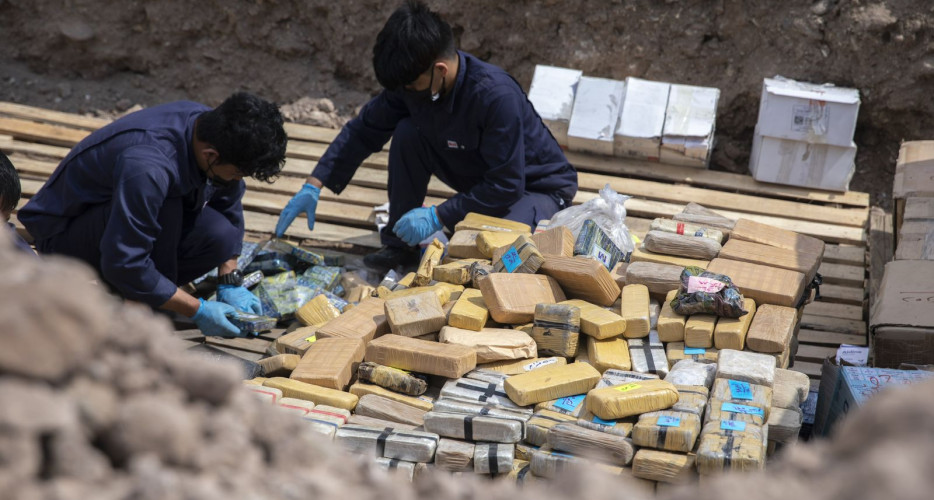Kurdistan Region sees dramatic increase in drug arrests since 2014, putting prisons under strain

Peregraf- Sangar Salar
The number of people imprisoned in the Kurdistan Region for drug use and trafficking is on the rise and now account for almost 1/5 of all those behind bars, according to the Kurdistan Regional Government (KRG).
KRG Minister of Labor and Social Affairs Kwestan Mohamad said at a conference in Erbil on October 15 that out of the 5,283 prisoners in the Region, 1,097 are serving sentences related to narcotics.
Of those, 480 were convicted of trafficking and 617 of drug use. In terms of gender, 1,023 of them are male and 74 are female.
Additionally, there are hundreds of people with drug cases pending against them.
“I never wanted to be near that stuff. I was taught by a woman. I was a smoker myself and she gave me a ‘cigarette’ that made me nauseous. I didn't know there were drugs in it,” said one drug user, who spoke to Peregraf on condition of anonymity about how she started taking drugs.
"Drugs are very painful. You get tired of yourself. It affects everything, your home, your children, and your relatives," she added.
With users also come traffickers, who facilitate the sale of drugs.
“At first, I was a drug user, then I dealt drugs. I got drugs from Ranya and Hajiawa and sold them to people [in Erbil]. Then three or four people sold them for me,” said a trafficker, who also talked to Peregraf on condition of anonymity.
“I had a shop in the industrial area. I put all my work into drugs and my father died of grief," he said.
Both the trafficker and the user are currently serving prison sentences.
Mohamad told the conference that the rapid increase in the number of prisoners behind bars for drug offenses is putting a major strain on the prison system.
“We have three adult correctional facilities that were originally built for 900 prisoners, but they have three times as many. There are three women's and children's correctional facilities, which were not originally built for that purpose,” Mohamad said.
The minister reported that officials had provided drug treatment inside the prisons by conducting 22 meetings and other activities that reached 577 prisoners. While some prisoners could benefit from medication to help them with addiction, these are not yet available in the Kurdistan Region or only in very limited supplies.
Mohamad also claimed that the current KRG cabinet had cracked down on people who smuggled drugs into the prisons, but admitted that the practice persisted.
"Those who use drugs in prisons still resort to their relatives to bring them in," she said.
Over the last several years, the Kurdistan Parliament passed a new law on narcotics and the cabinet formed a dedicated committee to deter drug use and trafficking and increased funding for treatment, but there has been little progress in curbing illegal drug use.
“The threat is nothing short of terrorism,” Mohamad said.
That sentiment was echoed by KRG Prime Minister Masrour Barzani. He said at the same conference that “the Kurdistan Region is being opposed in various ways and attempts are being made to weaken it. One of the most dangerous ways is drugs, which are one of the weapons used to destroy the order of our society.”
“The mafia and drug traffickers are taking advantage of the Kurdistan Region's geographical location as a gateway to smuggle drugs to other places," he said, singling out groups operating in Iraq’s disputed areas and in neighboring countries as largely to blame.
The General Directorate of Drugs in Erbil reported that the security forces seized 270 kilograms of various drugs, including opium, hashish, crystal meth, cocaine, heroin, and marijuana in the first six months of 2023. As part of this, they confiscated 147,000 pills, 6,555 vials of injectable drugs, and 6,632 other items of paraphernalia.
During the same period, the directorate indicted approximately 600 suspects on drug charges and sent their cases to the court. A total of 276 drug dealers and 475 users were arrested.
Arrests for narcotics offenses have increased significantly over the past decade. According to data supplied by the Coordination Network of Organizations, there were just 142 arrests in 2014, but 2,017 last year. This constituted an increase of 1,420 percent.
Before the new narcotics law, which was passed in 2020, the KRG relied on Iraqi Law No. 68 of 1965 to convict drugs users and traffickers.
However, the Kurdistan Regional Judicial Council ruled that it was “a very strict law and contained very heavy penalties for drug traffickers and users.”
The new law follows international medical guidance to treat addicts and drug users as patients, but the change has proved controversial.
Abdul Jabbar Aziz, head of the Kurdistan Regional Judicial Council, told the conference in Erbil that this was the wrong approach and that it should be re-amended to be more punitive.
"The sentence for drug users should be at least five years in prison. For traffickers, the punishment should be life imprisonment and the death penalty," he said.